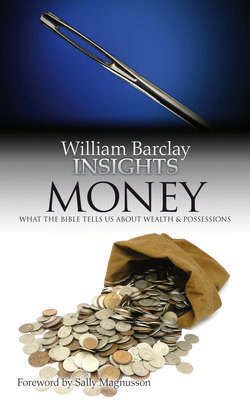Читать книгу Insights: Money - William Barclay - Страница 6
На сайте Литреса книга снята с продажи.
ОглавлениеForeword
In 2008, an economic crisis convulsed the world. The comforting certainties of banking, the arcane but apparently unshakeable architecture of money and credit which had bolstered our economies and made millions of us in the west far better-off than our ancestors could have dreamed, collapsed. Just like that.
The key phrase was ‘crisis of confidence’. But confidence in what? As the very foundations of the banking system trembled, one question slithered uneasily to the forefront of many minds: was it our confidence not just in banks’ ability to lend, but in money itself, that had been so terribly misplaced?
William Barclay wrote his biblical commentaries decades before phrases like credit crunch and Libor rate were tripping nervously off our tongues, but you would hardly know it.
‘Suppose a person’s life is so arranged,’ he muses, ‘that happiness depends on the possession of money; suppose a recession and economic crash comes and that person wakes up to find the money gone; then, with the wealth, happiness has also gone.’
He is commenting on Jesus’ powerful command not to lay up treasures on earth, ‘for where your treasure is, there will your heart be also’. It is as important a reminder to governments and banks as to individual investors and borrowers that, if money becomes our god, then our well-being is on a shoogly peg.
It is immensely valuable to have so much of the New Testament thinking on wealth and possessions brought together in one volume, nimbly negotiated by such a generous and well-stocked mind as William Barclay’s. To elucidate these texts, he invites us on a series of entertaining mental journeys, taking in along the way the horrors of Victorian child slavery, the poetry of Robert Burns, the magisterial Thomas Carlyle as a boy breaking open his piggy bank for a beggar, Robert Louis Stevenson being offered an omelette by his servants and the scarlet anemones blooming on the Palestinian mountainside.
Along with this capacity for colourful and telling illustration, Barclay is also not afraid to be personal. Behind the commentaries on Christ’s tough, counter-cultural words on wealth, you can detect a man struggling with his own conscience. He says of the widow’s mite: ‘There can be few of us who read this story without shame.’ He goes on to suggest that our difficulty in giving, as she did, in a way that hurts, is also symbolic of how we continually hold back in our relationship with God. ‘We rarely,’ he says, ‘make the final sacrifice and the final surrender.’
Barclay is never afraid of a pithy phrase or even the occasional reckless generalisation. One might cavil here and there at his conclusions, but he is never less than engaging. With his scholarship worn lightly but always to the fore, he leads us towards a judicious understanding of where the New Testament stands on money, reward, labour and the correct use and status of possessions.
The possession of wealth, he notes, is not a sin but a responsibility, and people are always more important than things. Two principles which would stand the world’s economies in good stead – if they only listened.
SALLY MAGNUSSON
